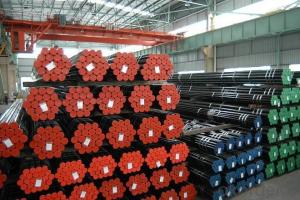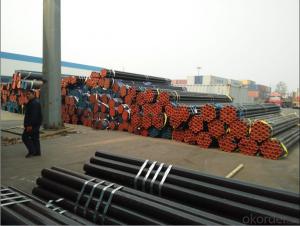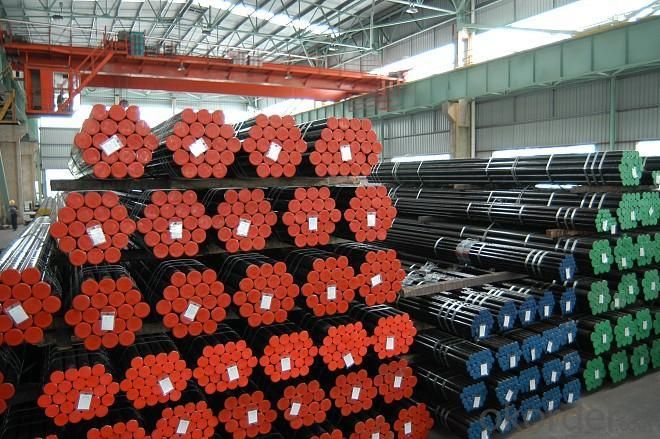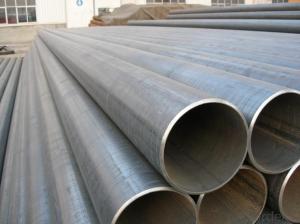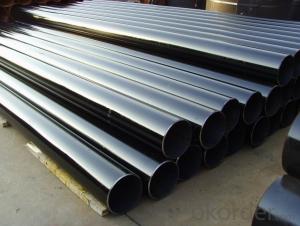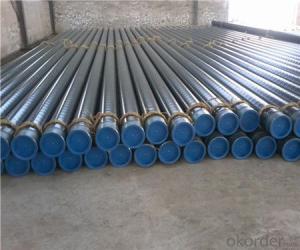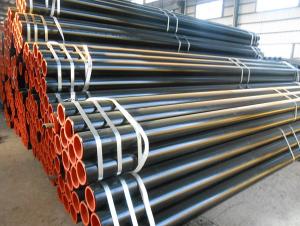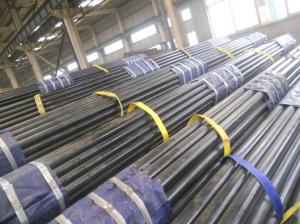API 5L, Gr.B Seamless Steel Pipe With Good Quality
- Loading Port:
- Tianjin
- Payment Terms:
- TT OR LC
- Min Order Qty:
- 25 m.t.
- Supply Capability:
- 8000 m.t./month
OKorder Service Pledge
OKorder Financial Service
You Might Also Like
1、Structure of API 5L, Gr.B Seamless Steel Pipe With Good Quality With All Sizes:
Seamless pipe is formed by drawing a solid billet over a piercing rod to create the hollow shell. As the manufacturing process does not include any welding, seamless pipes are perceived to be stronger and more reliable. Historically seamless pipe was regarded as withstanding pressure better than other types, and was often more easily available than welded pipe. The usuage is for conveying gas, water, oil and so on.
2、Main Features of API 5L, Gr.B Seamless Steel Pipe With Good Quality With Various Sizes:
• High manufacturing accuracy
• High strength
• Small inertia resistance
• Strong heat dissipation ability
• Good visual effect
• Reasonable price
3、API 5L, Gr.B Seamless Steel Pipe With Good Quality Specification:
Standard | GB, DIN, ASTM ASTM A106-2006, ASTM A53-2007 |
Grade | 10#-45#, 16Mn 10#, 20#, 45#, 16Mn |
Thickness | 8 - 33 mm |
Section Shape | Round |
Outer Diameter | 133 - 219 mm |
Place of Origin | Shandong, China (Mainland) |
Secondary Or Not | Non-secondary |
Application | Hydraulic Pipe |
Technique | Cold Drawn |
Certification | API |
Surface Treatment | factory state or painted black |
Special Pipe | API Pipe |
Alloy Or Not | Non-alloy |
Length | 5-12M |
Outer Diameter | 21.3-610mm |
Grade | 20#, 45#, Q345, API J55, API K55, API L80, API N80, API P110, A53B |
Standard | ASME, ASTM |
1) Material:20#(ASTM A 106/A53 GRB.API5LGRB,GB),45#,16Mn,10#.
2) Specification range:OD:21.3-610mm,WT:6-70mm,length:6-12m or according to the requirement of clients.
3) Excutive standards:GB,ASME API5L.ASTM A 106/A53,Despite of the above standards,we can also supply seamless steel pipe with standard of DIN,JIS,and so on,and also develop new products according to the requirements of our clients!
4) Surface:black lacquered,varnish coating or galvanized.
5) Ends:Beveled or square cut,plastic capped,painted.
6) Packing:bundles wrapped with strong steel strip,seaworthy packing.
4、Packaging & Delivery
Packaging Details: | seaworthy package,bundles wrapped with strong steel strip |
Delivery Detail: | 15-30days after received 30%TT |
5、FAQ of API 5L, Gr.B Seamless Steel Pipe With Good Quality:
①How is the quality of your products?
Our products are manufactured strictly according to national and internaional standard, and we take a test
on every pipe before delivered out. If you want see our quality certifications and all kinds of testing report, please just ask us for it.
Guaranteed: If products’ quality don’t accord to discription as we give or the promise before you place order, we promise 100% refund.
②How about price?
Yes, we are factory and be able to give you lowest price below market one, and we have a policy that “ for saving time and absolutely honest business attitude, we quote as lowest as possible for any customer, and discount can be given according to quantity”,if you like bargain and factory price is not low enough as you think, just don’t waste your time.Please trust the quotation we would give you, it is professional one.
③Why should you chose us?
Chose happens because of quality, then price, We can give you both.Additionally, we can also offer professional products inquiry, products knowledge train(for agents), smooth goods delivery, exellent customer solution proposals.Our service formula: good quality+good price+good service=customer’s trust
SGS test is available, customer inspection before shipping is welcome, third party inspection is no problem.
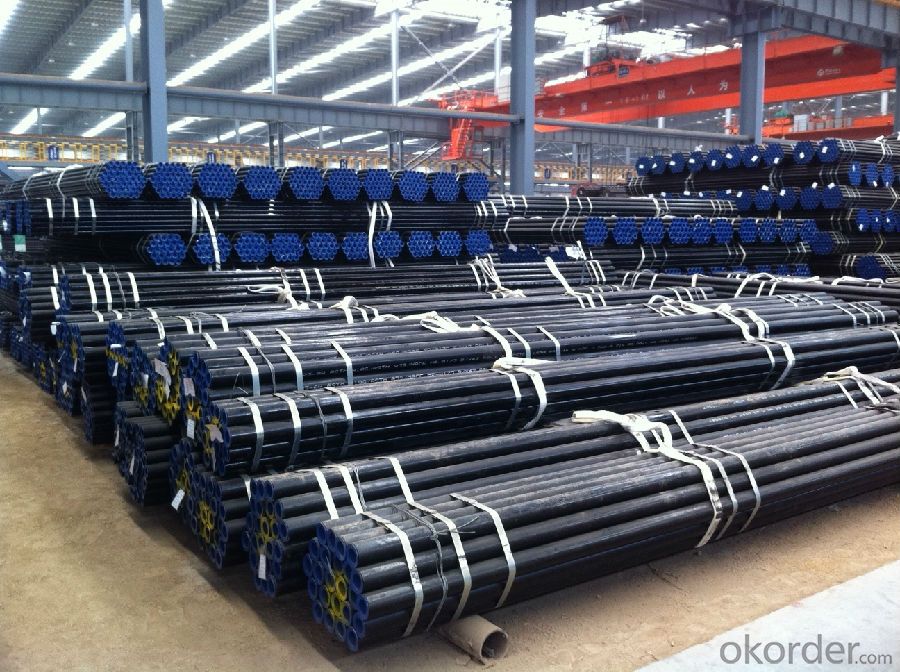
- Q: What are the non-destructive testing methods used for steel pipes?
- Some of the non-destructive testing methods used for steel pipes include ultrasonic testing, magnetic particle testing, liquid penetrant testing, radiographic testing, and eddy current testing.
- Q: What is the typical diameter range for steel pipes?
- The typical diameter range for steel pipes varies, but it typically falls between 1/2 inch to 48 inches.
- Q: Are steel pipes suitable for underground mining operations?
- Yes, steel pipes are suitable for underground mining operations. Steel pipes are known for their durability, strength, and resistance to corrosion, making them ideal for use in harsh underground mining environments. They can withstand high pressure and are capable of transporting various substances, such as water, air, or mining materials, with reliability and efficiency. Additionally, steel pipes can be customized to meet specific mining requirements, ensuring their suitability for underground operations.
- Q: How are steel pipes sized and classified?
- Steel pipes are sized and classified based on their outer diameter, wall thickness, and length. The sizing is done using standard measurements such as nominal pipe size (NPS) or nominal diameter (DN). Classification is determined by factors such as the pipe's pressure rating, material composition, and intended use. This helps ensure compatibility and proper installation in various applications such as plumbing, construction, and industrial processes.
- Q: Is the electric pipe used with steel pipe or PVC pipe?
- Electric pipe laying is generally divided into the following circumstances:1) the explosion-proof area must be galvanized steel pipe and explosion proof flexible pipe (used for front end equipment connection);2) non explosion-proof area can use KBG pipe or PVC tube, the former is higher cost, but the installation is firm, the latter is low cost, easy to construction, and in the rain where it will not rust, but compared to the KBG pipe may be damaged.
- Q: What are the applications of steel pipes?
- Steel pipes have a wide range of applications in various industries due to their durability, strength, and versatility. Some of the common applications of steel pipes include: 1. Plumbing and water distribution: Steel pipes are commonly used in plumbing systems to transport water and other fluids. They are resistant to corrosion and can withstand high pressure, making them ideal for water distribution networks in residential, commercial, and industrial buildings. 2. Oil and gas industry: Steel pipes are extensively used in the oil and gas industry for the transportation of oil, natural gas, and other petroleum products. They are able to handle high-pressure and high-temperature environments, making them crucial in drilling, production, and refining processes. 3. Construction and infrastructure: Steel pipes are widely employed in construction projects for various purposes such as structural support, foundations, scaffolding, and underground piping systems. They provide a strong and reliable framework for buildings, bridges, tunnels, and highways. 4. Industrial applications: Steel pipes are used in various industrial applications such as manufacturing, power plants, chemical processing, and food processing. They are often used to transport liquids, gases, or slurries within the production processes or to transfer heat in heat exchangers and condensers. 5. Agricultural sector: Steel pipes are commonly used in the agricultural sector for irrigation systems, particularly in large-scale farming. They are used to transport water from a water source to the fields, ensuring efficient and controlled water distribution. 6. Mining industry: Steel pipes are utilized in the mining industry for the extraction and transportation of minerals, ores, and other mining materials. They are resistant to abrasion and corrosion, making them suitable for the harsh and demanding conditions of mining operations. 7. Mechanical and automotive applications: Steel pipes find application in the manufacturing of various mechanical components, such as automotive exhaust systems, hydraulic cylinders, and precision tubing. They offer high strength, dimensional stability, and resistance to impact and vibration. 8. Infrastructure and utilities: Steel pipes are commonly used in infrastructure projects for the transportation of sewage, stormwater, and wastewater. They are durable, resistant to chemical corrosion, and can withstand underground conditions, making them suitable for sewer and drainage systems. In summary, the applications of steel pipes are vast and diverse, ranging from plumbing and water distribution to oil and gas industry, construction, agriculture, mining, mechanical and automotive sectors, and infrastructure projects. Their robustness, versatility, and ability to withstand extreme conditions make them a fundamental component in numerous industries.
- Q: What is PE coated steel pipe? Seek explanation
- The appearance of the native HDPE is milky white and is somewhat translucent in the narrow cross section. PE has excellent properties that are resistant to most life and industrial chemicals. Polyethylene (PE) pipe due to its unique advantages and is widely used in building water supply, drainage, underground drainage pipe, building heating, gas pipelines, electrical and telecommunications, industrial protective casing pipes, agricultural pipes etc.. The utility model is mainly used for urban water supply, urban gas supply and farmland irrigation.
- Q: Are steel pipes suitable for underground nuclear waste storage?
- Underground nuclear waste storage does not lend itself to the use of steel pipes due to their unsuitability. Despite their strength and durability, steel pipes are susceptible to corrosion when in contact with certain forms of nuclear waste. As time passes, the radioactive elements can corrode the steel pipes, potentially leading to leaks and the contamination of the surrounding environment. Furthermore, steel pipes lack the necessary design to endure the extreme temperatures and pressures commonly found in nuclear waste storage facilities. Consequently, alternative materials like corrosion-resistant alloys or concrete are generally employed for underground nuclear waste storage to guarantee the confinement and isolation of hazardous substances.
- Q: How are steel pipes protected from damage during transportation?
- Steel pipes are typically protected from damage during transportation through various methods such as wrapping them in protective coatings, using foam inserts, securing them with straps or braces, and placing them in sturdy packaging materials to prevent any movement or impact. Additionally, pipes may also be stored and transported in specialized containers or racks specifically designed for their safe transportation.
- Q: What is the difference between seamless steel pipes and seamless alloy steel pipes?
- The main difference between seamless steel pipes and seamless alloy steel pipes lies in their composition. Seamless steel pipes are made from carbon steel, while seamless alloy steel pipes are made from various alloying elements such as chromium, nickel, or molybdenum. These alloying elements enhance the properties of the steel, making it more resistant to corrosion, higher in strength, and suitable for specific applications in industries like oil and gas, chemical, or power generation.
Send your message to us
API 5L, Gr.B Seamless Steel Pipe With Good Quality
- Loading Port:
- Tianjin
- Payment Terms:
- TT OR LC
- Min Order Qty:
- 25 m.t.
- Supply Capability:
- 8000 m.t./month
OKorder Service Pledge
OKorder Financial Service
Similar products
Hot products
Hot Searches
Related keywords
